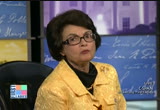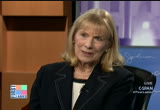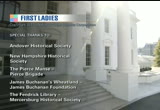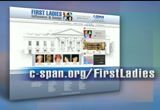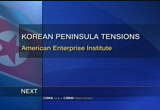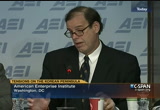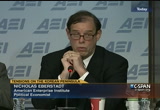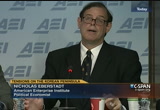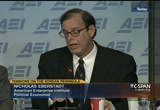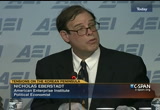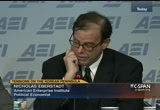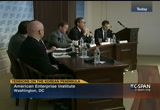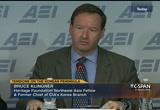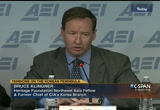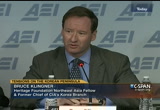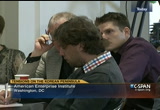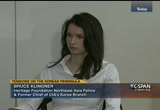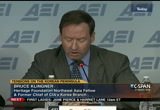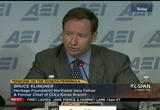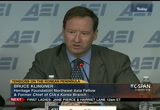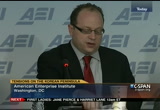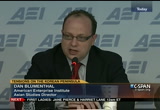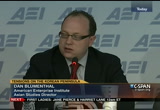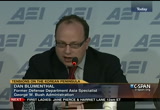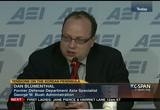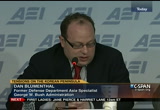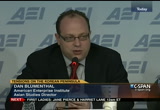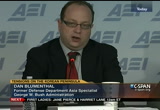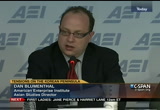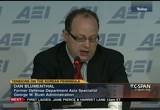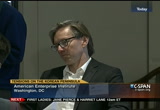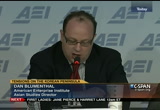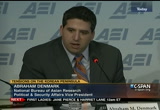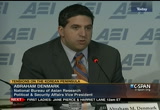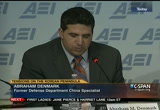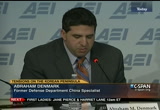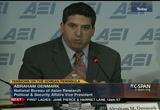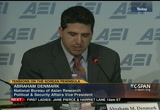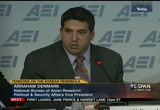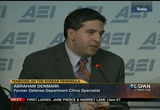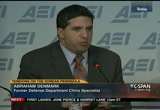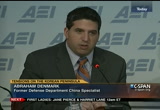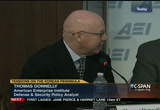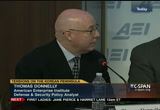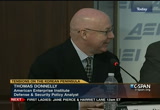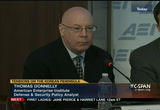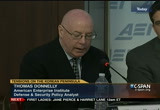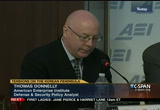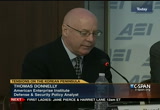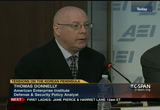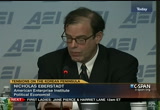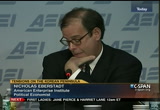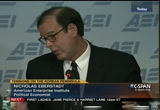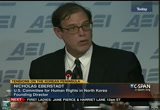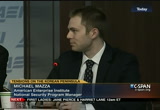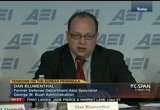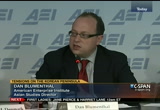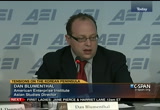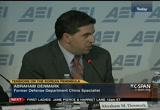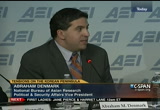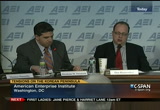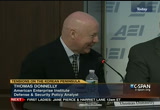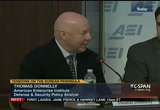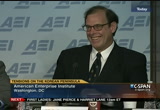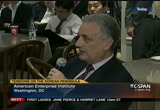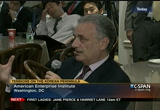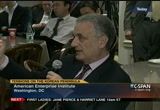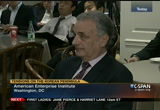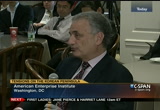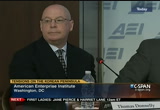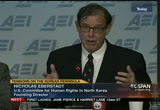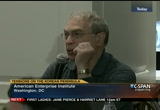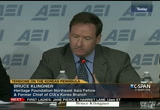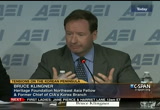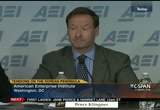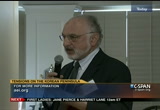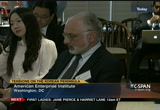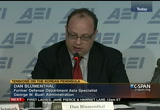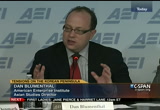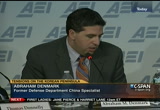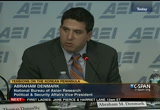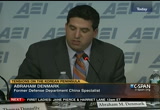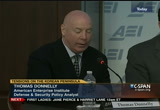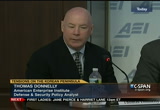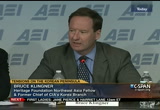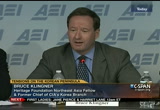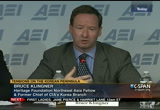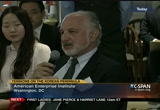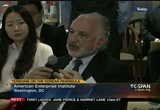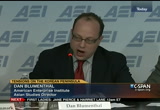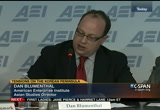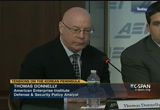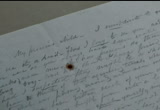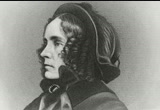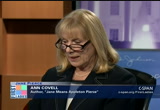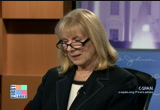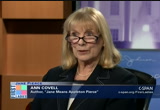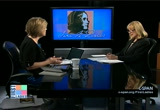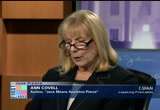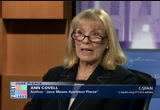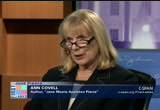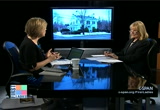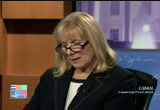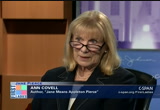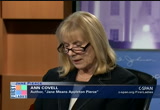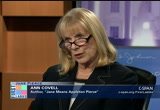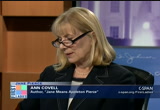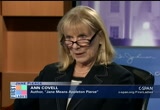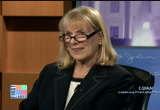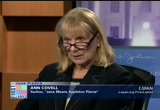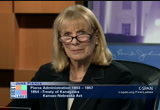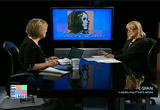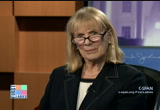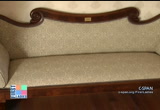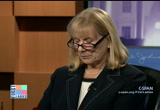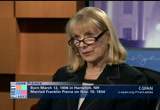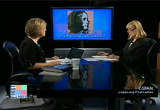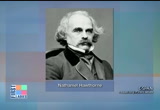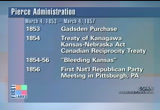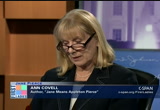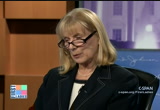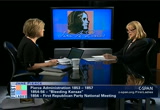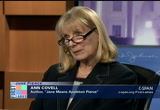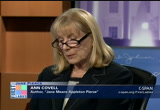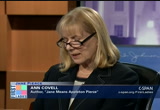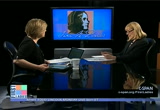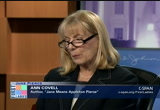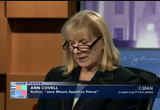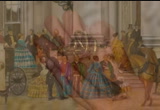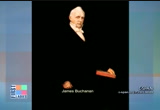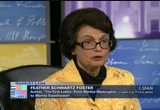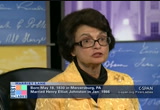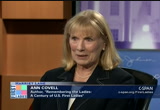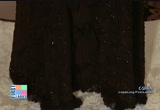tv Politics Public Policy Today CSPAN April 15, 2013 10:30pm-1:00am EDT
10:30 pm
in terms of her importance. >> second. >> i would put her right below -- if she were mrs. buchanan instead of niece of buchanan, i think she would be second to dolly. >> i still think so even though she is miss lane and not mrs. buchanan. >> why is that? >> the interest she had in people. everybody loved her. she brought -- cordiality to the role of first lady after the previous two or three presidencies. she was a great girl, and everybody loved her. >> i want to thank our guests
10:31 pm
for this program on jane pierce first and harriet lane. both of our guests have books available l where you can read more about these first ladies. one is "remembering the ladies," and "first ladies an intimate portrait of the women who shaped america." thank you to both of you for being with us, and thank you to all of you for being our audience this evening. ♪ 6
10:32 pm
>> our series of first ladies continues next week. we will look at mary todd lincoln. we will travel to her childhood home of lexington, kentucky. watch next monday live at 9:00 p.m. eastern. and our website has more about the first ladies, including a special section, "welcome to the white house" produced by our partner, the white house historical association which chronicles life in the executive mansion during the tenure of
10:33 pm
each of the first ladies. with the association, we are offering a special edition of the book "first ladies of the united states of america" presenting a bog if i and pour -- biography and pour trait -- pportrait of each first lady. >> c-span, created by america's cable company's in 1979, brought to you as a public service by your television provider. >> secretary john kerry wrapped up his talks about north korea. next they talk about military and diplomatic options. this event is hosted by the
10:34 pm
american enterprise institute. >> i thought i might spend a couple minutes discussing some of the discussing domestic politics perhaps recalling some of the theatrics we have seen. we don't always think of it this way, but the north koreaian system, like all other political systems operated by human beings, does indeed have domestic politics. if we pay attention and try to understand some of the domestic politics entailed, we may be better placed to deal with some of the external man fest --
10:35 pm
manifestations and love plers that they are sending us and so forth. to begin we need to talk about not the current ruler of north korea, but his father. kim jung il was not a bad king. he was an extraordinarily bad king. he was a disastrous king for that system. ly explain what i mean by this. he had decades of preparation accorded to him of his reign. his father died in 1944. two years before that, his dad told foreign reporters that his son, kim jung il had been in charge of day-to-day policies for the previous decade.
10:36 pm
that takes us back to the early 1980's. if you want to get into real inside baseball, north koreaian media was talking about the rise of the party center in the 1970's. party center being eventually debuted as kim jung il. he had about a quarter century of grooming before becoming the king. he had a long time to consolidate authority. with with his hands on the dashbored, he-dived the plane. he was the only -- he more or less destroyed the institutions of party and state. so by the late 1990's and early
10:37 pm
2000's there was no correspondence between what the party was supposed to look like and what the cabinet and state system was supposed to look like and the way he was operating the government. he was more or less running the country out of his bathtub with a couple of police secret forces to help. he paid no attention whatsoever to continuing the dynasty. he was completely feckless on this. there was no consideration who was going to rule next until he had his stroke. then they had to play catch-up with a man who had no military or government experience. this takes us to where we were when kim jong il died. he had two things very much on his mind at that time. one was consolidating the thrown, and one was
10:38 pm
10:39 pm
at the funeral procession, there were eight people. there was kim jongu un. 3-4 military people have suffered very bad experiences with their careers since then. this is not necessarily a situation of dealing with hard liners, which is the siren song of the early days of the soviet union. this is not a moderate or hard-liner thing. this is getting rid of military people that were not under immediate state control for the system. last year we didn't hear much at all in the way of sabre rattling. there was a failed missile test and then a bit of quiet. now we're seeing the fake-down
10:40 pm
-- shake down. now there are two observations about this as this proceeds. my colleagues will talk more about this. i think we have seen this before. there were surely soon be calls for negotiation with this government. bear in mind that these are all legitimize jim jong un's rule. whatever else they do, they are a signal to home that this guy has engainled the outside world on his own terms. it reads very well back home.
10:41 pm
of course the north koreaian side wants face-saving solutions. given his calculations and the circumstances of this state, i submit that kim jong un and company can stand to lose a little face when they play this way. they deserve to, and if we are smart, we will range that outcome dwsharge that outcome every time we have a pleasant situation like this. thank you. >> thank you. my lane in the road is south korea. south korea's approach, military reform since 2010. it will be perhaps a bit more tactical.
10:42 pm
cumulatively, south korea is much more likely to respond to a clash. i think the situation has changed not only in the blue house but in the lay of the land as well as the political landscape. first of all, the new south koreaian president has vowed publicly and in private to respond forcibly and really exponentially, the next time north korea does an attack. why would this be different from the previous vows? in my discussions with senior officials in her administration, they made clear they were critical of not retaliating to previous attacks, and they vowed she would hit back. more importantly than that, before her naugs inauguration, her predecessor made a number of
10:43 pm
changes in the south koreaian military that would have led him to respond more forcefully had their been another attack. if you remember back before the most recent attack, he was criticized by the south korean public for not hitting back. he replaced his defense minister . more importantly, he chade changed the rules of engagement. previously the rules of engagement on those islands, the disputed islands, the disputed area, was that for every round of incoming north koreaian al artillery, south korea was able to respond with one caliber lower. so he was out in calibrating,
10:44 pm
was that a 52 or 54 category? implet ng yong bok did away with that. he also said he ordered south koreaian fighter bombers to spond respond but was told by his military personnel he was not allowed to do that. instead, he would need permission from the united states. if you tuck to u.s. officials, they will say that is not the case. but at least that was the perception. and i talked to south korean intelligence and they said that was there perception that they were not allowed to use those weapons without u.s. permission. that has also been removed. the u.s. visited in 2010 and made a public statement, it is their planes. they can do with it as they see fit. and then privately there has been a change in perception.
10:45 pm
so even under his rule, they said if there was a battery attack, they would take out three. what we saw in the next administration is a spokesperson for the joint chiefs of staff said they would not only limit -- they would not limit to the point of origin. they would take out supply elements and command elements. there was some confusion as to what that meant. military official anonymously or privately said, what they were talking about was not on the one hand not supreme headquarters, but also not an artillery baton, but also head quarters.
10:46 pm
also, he pushed them to respond more. where in the past it would have been a question of, respond to an attack, then the blue house would be, more ammo, i am out. also they increase the military personnel in the west sea area. they created a northwest islands command. he controls south korea reversed the planned cuts to the marine corps and augmented it with 4,000 additional marines. and they have also increased the procurement for anti-submarine wherefare including anti-submarine scensors. they have augmented forces, they have pushed the decision down to
10:47 pm
a lower echelon. how would the u.s. get involved? just last month the u.s. and south korea signed a counterplinks -- combined combined counter proliferation contingency plan. on the one hand it seems to require south korea to confer with the u.s. on the one hand you can see it as a way of the u.s. inhibiting south koreaian response. on the other hand, it would involve the u.s. in a combined response at a lower level of clash than would normally be the case either under the arm stiss or the united nations command rules of engagement. so we don't know the details of it. it would very likely depend on the situation. all of that, i would think, is more likely to make a south korean response and an
10:48 pm
escalatory response more likely. also under a proposed defense reform plan that the south koreaian prime minister has before her, south korean has switched from a pro-defense to an active deterrent strategy. that means if they have imminent signs of attack, they will pre-empt. defense officials point out that is more likely to be in a strategic threat rather than tactical. so that means, if they feel they are about to get hit with some artillery in a west sea island, they are not likely to initiate this, instead absorb it and then respond. what they are talking about is more a situation where if they see a missile, they think it is nuclear armed, it is at a time of hostility, it could be an imminent attack on south korea, then according to the new strategy, they would take out that missile.
10:49 pm
that requires perfect intelligence, and you can never tell what kind of warhead is on a missile. if the situation is now at even a higher tension right now and they observe missiles or scud missiles would they take those out? we don't know. my time is up but i would just lay a marker for during the q and a's the recent d.i.a. of the current nuclear war capabilities, as well as senator kerry's trip, which in a nuthshell, we were eyeball to eyeball and john kerry blinked so now i think we are at a less likelihood of a military clash than we were before. thank you. >> thank you. i have to say first as a caveat, i suppose, a lot of the suggestions that i'll put on the table are probably not just in
10:50 pm
the washington parlance o.b.e., overtaken by events, as they were in mr. kerry's trip, but never were probably in the first place. that's a strange way to begin a talk, i know. but let me put some of the ideas out there anyway, in case anyone wants to take them up at a different time in a political life. so i want to focus first on the case of a chinese town called dondong. i want to focus on it because i want to focus on the lack of seriousness on the part of the chinese when it comes to doing anything of any substance or merit in terms of shutting down what anyone agrees is a criminal enterprise that had state sovereignty, which is the state of north korea.
10:51 pm
so with some fanfare, for people that watch these things, the chinese shut down a branch of a north korean bank recently that funnels currency into north korea. however, as the daily telegraph reported, about 60% of the funds still flow, and maybe another $60 billion is going through the black market from dondong into north korea. it is a place where north korean leaders and agents come regularly, still, even up to a year ago, to buy all the luxury goods they could possibly want from iphones to caviar to swedish pornography or whatever else they are into. i'm not judging. i'm just saying that's what they like.
10:52 pm
it is also a place where a pipeline pipes oil into, at least a place on the pipeline, which provides northkorea with 80% in total. there is something called the bank of dandong which on a regular basis, even up to last week, was reported is cont con taggantly used to transfer money back from north korea to china. that hasn't stopped not a wit. the chinese interviewed in this basically said the shutting down of the north korean bank was a little bit of an inconvenience, but business continues.
10:53 pm
as far as the successful policy of 2003, 2006 was to shut down this policy. which inn facts is always a good policy. a prime money laundering concern. the entire economy is a prime money laundering concern. the famous subject on the banks of delta asia and macau which tracked down successfully kim's own money, that's the father, nearby dandong is the port of
10:54 pm
dal lifment on. recently a couple years back, the south africans found one of these ships as it came into a south african port filled with chinese rice and wheat and north korean weaponry of all kinds. it obviously had been inspected in dalleon and had been oked for onward proliferation to north korea. let's look at a couple more statistics. their exports to china has quadrupled during this period of 2008 to 2011 of strategic
10:55 pm
patients and tough financial sanctions and what have you and various u.n. resolution and so on and so forth. so trade may have doubled. according to bun of the prime watchers of north korean economics external and interm, north korean may in fact be running a trade surplus, which i think would shock a lot of people for any poor country. meaning it is exporting capital. north korean is exporting capital. where is that capital going? well, probably mostly to banks in china for the kim regime and luxembourg and other -- switzerland and other locales.
10:56 pm
also, just to be sort of bipartisan here in my criticisms, since 1998, north korea has used a lot of this hard currency to spend up to $3.2 million on missile -- $3.2 billion on missile through thick and thin in sanction and nonsanction. how do we make sense of this in the case of china? i think we all agree, everyone in this room, we all agree that north korea is one big criminal enterprise that happens to enjoy state sovereignty, but china will not do what it takes to shut it off. without it, we can't shut it off ourselves. so why is china acting in this way? well, first history, of course. the struggle for centuries with japan over the korean peninsula and the u.s. korean war and all the memories of what might happen in terms of allowing korea so completely be in the
10:57 pm
hands of hostile fours powers. the second would be strategy. it enjoys stability on its borders. the question what china asks, of course, if kim collapses, what would you do about a surge of u.s. forces coming into north korea to secure refugees? what do you do after that with those forces? and a third is incentives. that actually points to aven answer. the risk calculus very much favors the status quo. and why? for the reasons i said before. why would china want to take any risks of helping to bring the quim regime down if all it gets in return is a flow of korean refugees and south korean and u.s. forces close to its border?
10:58 pm
well, in my time in government i witnessed for a very short period of time what does move the chinese to put pressure on north korea. one of which was an actual credible threat that japan would go nuclear. that is gone for the most part. it may return in the next few years, but it is basically gone. the next was the belief that george w. bush was just crazy enough to strike the nuclear facilities, particularly after the iraq invasion. the other thing that got the chinese' attention was indeed designating north korea as a prime money laundering concern. because, again, the chinese were very concerned that we would take that to its full extent and find chinese banks to be aiding and abetting a prime money laundering concern which means they could not do business with the international financial community. i'm going to speculate that today for a variety of reasons dating back to 2006-2007 when
10:59 pm
the bush administration decided essentially overnight to remove all the levers of coercive power it had on the north creans and up too today, i'm going to speculate that the chinese do not believe the u.s. is credible either in military action to defend itself or its allies. when i say "defend" i'm talking about some of the things that bruce is talking about before. nor is the u.s. really credible in shutting down the criminal enterprise. because if it was, it would take harsher actions against chinese enterprises involved in this. so the answer is, change the risk calculus. that means, be credible. credible in your threat to take out nuclear facilities and ballistic missile sites. credible to respond to threats disproportionately. this is not a gentleman's game
11:00 pm
of cricket where they whack one site and we say we're going to whack another site, like a statue. be disproportionate. we are still a super power here. incredibly shutting down a criminal event mies, which means going after any institutions that is aiding and abetting the money laundering of the kim regime. this calls for concerted effort among all financial centers the world over: .
11:02 pm
negotiations on and off with north korea. which i think overall you can say so far have been a failure. no.y have not prevented 3's pursuit of nuclear weapons. we have pursued a wide variety of mixes of carrots and sticks to try to cajole, encourage, and in some way to give up their nuclear capabilities. so far ultimately we have not been successful in this endeavor. even our successes we have had over the years have been partial. which i -- framework count as a partial success, before we initiated some people in the u.s. government assessed able torea would be produce some success. certainly not a success but certainly better than if nothing
11:03 pm
had happened. and sanctions that were successful, they put pressure on north korea, put pressure on china but they did not prevent north korea from continuing to pursue its nuclear capabilities. the 2007 agreement that was reached which i also have problems with. but did result in the destruction of a cooling tower but it did not stop the nuclear capabilities. especially the pursuit of the uranium capability that was admitted to later on. throughout these negotiations, you have heard our alliance relationships at times going further in negotiations than our allies would have preferred. ultimately, beyond the nuclear program, these efforts, the characteristics have not only failed to prevent north
11:04 pm
korea from pursuing its nuclear capability but also from developing fissile capabilities low-level attacks against south korea. that is the case for depression. the model for success has yet to be found. everyone is trying to develop the unified field theory of north korean policy. right measuresct of carrots and sticks, what is the right track, what is the right offer, i am not saying that that unified field theory is not out there, we have not found yet. where we are in terms of where we are not in the bush administration's approach -- obama's administration's approach. there is an assessment coming into the obama administration that the united states has overreacted to north korea. provocations and overtures. that when there was a hint from
11:05 pm
p'yongyang they would be willing to make some improvement, we would get to the negotiating table. similarly, when it was a provocation we wrap up quickly. we wanted to see if we could break that cycle. in the first few years we saw a and we generally stuck to our guns and principles and cut the door open for discussions on the conditions of what north korea had already agreed to. i think it is important to note that we should not confuse strategic patients with standing still. the u.s. has been fairly active in its approach to north korea more broadly, in terms of enacting robust sanctions against north korea. other forathe un and
11:06 pm
to enhance our sanctions and international pressure and to isolate p'yongyang. also the efforts to enhance our alliance of partnership capabilities and enhance our military presence in the region under the strategic rebalancing, also buttressed allied confidence. if you look back into some messages that were coming out especially from seoul but tokyo the years before rebalancing, there was a lot concern that our commitments would limit our ability or willingness to come to their defense. been fairlyave richard. -- reassured. our allies have been more reassuring than they have been in the past. it was better now than it was in
11:07 pm
the past. it is nothave -- possible to approve the opposite of that. there would not have been deterred. so far it seems i am so good but also we're making sure to provide off ramps were no. 3 which i think is an important element of any strategy anecially in -- in emergency. also think we should realistically acknowledge that we have had some movement with china. abouted the skepticism tschida's willingness and functional ability to tighten down on china -- north korea. especially when it comes to its nuclear programs. we should also announce that china did vote for more sanctions in the un and the
11:08 pm
recent tensions with north korea discussion in a beijing about whether or not continuing to support north correct is in beijing's continued interest. this is a discussion that is happening at a level of intensity we have not seen before, including messages from people from other state organs telling north korea they need to back down. of course, this is with all confidence, i am not asking china to come around to what ever it is we expect china to do on north korea but we have seen some movement and it is important to of knowledge that. where we're going, the fundamental problem in terms of having an undesirable choice between a problem that will be difficult to solve and an unacceptable status quo, that dynamic has not changed. it is probably not going to change. i expect we will continue to tighten sanctions, to enhance military capabilities on east
11:09 pm
asia, especially on the korean peninsula and to keep the door open for talks. that will continue although i do not expect that we will move beyond a previous commitment about making talks contingent on north korea accepting its denuclearization capabilities. we need to distinction. i am sure that we will talk about north korea. when to talk to north korea. i think there is a distinction that needs to be made before -- between having formal talks and negotiations and having open communication. open communication from new yorker other channels that are available. it is a smart way to manage crises. it is different from having formal talks, a sixth party talks or the framework they may be in. these are different things to talk about. maybe this is something that birds can comment on.
11:10 pm
as we look ahead for the potential for talks with north korea, to maintain a united front with our allies and partners over these talks, some folks in seoul have suggested it want to make sure we can -- the can of talks with north korea even if they have not backed from their plan to develop nuclear weapons. we have made this contention on they're making progress. some said they might want to have talks with them on that specific condition. there is a potential that there might be some daylight between the two sides. we need to talk very closely with sold to make sure that as we move forward that even if we have different approaches, different theories about how to talk with the north koreans or when that we maintain that united front and we're comfortable with where we're going forward. i will stop there.
11:11 pm
>> thank you. do you want to open it up? >> not really. what i would like to talk about left off, where we are and where we're going. you cannot do that without sort of reviewing the bidding thus far. the accommodation of what nick describes and what danita describes, the characterization of what is described about cult of personality. i'm not capable of judging which one of those is correct or which trade is uppermost in -- at any particular moment.
11:12 pm
gimmicks for a regime that is a big problem. regime that is a a big problem. i am sympathetic not only to this administration but to the of pastties administrations, particularly since the 1990's in crafting a long-term petraeus strategy. i think at some level we just have to accept things as they are and even though the koreans requiringslowed when the ability to build a ballistic missile that would carry a nuclear warhead, they're giving on it and that makes them a continuing problem. that also limits we can really do. nobody on planet earth has ever yet gone to war with a nuclear state. i do not expect that to change. however, the overall situation
11:13 pm
-- i would not characterize it. i instead see diminishing u.s. credibility and in part, of the korean response and the japanese response. it is motivated by uncertainty over u.s. capabilities and whether north korea is worth ofhting over in the u.s. calculus which is a pretty good question. it is a good question for the republic of korea and for the japanese. toeven if there is a three one tit-for-tat ratio from the south to the north, whether that is going to make the south koreans feel better and hopefully they will get away without without provoking a 31 or 9 to one response in return, it does not solve the underlying
11:14 pm
problem. back in the 1990's particularly at the time of the last session, crisis or turmoil, the smart money thought the north korean regime would collapse. that did not happen. nonetheless, that does not mean it will never happen or it cannot go on forever. in preparing and try to think long-term about this, it seems to me that that is the only willmstance under which likely to have a seriously important opportunity to do something strategically on the korean peninsula. that opens up a whole set of questions about what would happen if the north korean state or regime did collapse. it would be a state with nuclear capabilities and nuclear stuff
11:15 pm
and a clear people all over the place. and i am sure that one thing that all parties could agree on was trying to secure the materials, those people and whatever weapons exist. beyond that there is the question of what the future on the peninsula be. the koreans would have a view, i think we would have a view, the japanese would have a view. the chinese would have a view as well. possibly those would-be views that conflict with one another. and if there were former regime or other sorts of insurgents on the list, that would make for an ugly situation. and that's what i want to end up ath is a critique with pacific pettitte or rebalancing particularly in a way that is
11:16 pm
being interpreted at the pentagon as an offshore balancing strategy under the rubric of air-sea battle. we're trying to figure out a way to fight our way into a contested space and to strike targets. it is meant to be a china- focused doctrine but it is severely ruled out or does not deal with the career question. to conclude, and dan, whatpoint from should things look like if we were serious and translate them into terms of military posture and military strategy, we would go backward rather than forward. we would retain and improve for
11:17 pm
ofture and increase the size our force on the peninsula, rely less on dramatic fly by's with because theysery take a long time to get over the korean peninsula and there are very few aircraft and bombing circumstance would be useful but hardly the end of the story. and so i worry that this pivot or balancing and in particular -- military there for unfolds in the previous qdr review that was in the present policy strategic guidance of 2012 and driven by the budget crisis created by domestic politics in defense spending is
11:18 pm
unfortunatel have repercussions for our deterrent posture on the peninsula and the region but also our ability to generate the forced to take advantage of a genuine opportunity. i'm not predicting the collapse of the kim regime. unless we're able to do something to change the situation i'm not sure that i am praying for. it is not really up to me to determine the outcome. if we're going to be active than react toto be able to unforeseen or circumstances that are foreseeable although less that one would make for a positive change or would require us to do a heck of a lot more
11:19 pm
than using our philosophy. >> thank you. for your everyone interesting comments. have a comment and we will open up. the first question is for you. it painted a picture in which there is the norm. there a way for the u.s. to play at affecting that even if it is only at the edges? we are obviously looking through a glass darkly. --e what my observations take my observations for what they're worth which may not be much. what we know about the situation in the dp arcade near the top? near the top?
11:20 pm
is referred to in north korean as the dear leader. this -- notve with a fear, nor respected. r respected.o how can we move this to our benefit? to the benefit of even the slave population in north korea. i think that one of the most incisive and compelling sets of analyses about how to deal with dictatorships comes from somebody who was in this room, from peter ackerman who has
11:21 pm
developed this whole approach t resistanceiolenc toward dictatorships. thehere -- it is there in state but it is not too soon. we do not know about how cohesive the north korean dictator ship is at this point. we can guess it is in a very delicate situation because of a boy who had no training was put on the job to be the sun king an aunt and on goal who are looking after him with their own kid waiting in the wings. this is not a recipe for stability in any situation, much less a totalitarian dynasty. what should we be doing? we should be doing at least one thing that seems to be
11:22 pm
completely forgot about. e used to be called psyops, psychological operations. you couldn't call it propaganda. maybe we should call out our own style of propaganda. and put it in a north korea framework. we should be starting to have an esoteric dialogue with the second level tier of apparatchiks. they have no reason to trust each other. we want to encourage the breaking ranks there. the north korean side plays an awful -- pays an awful lot of attention to propaganda, towards us.south and towards the north korean government has announced it has nuclear targets forevery state in the u.s.
11:23 pm
four presidents, for arkansas, not for georgia, and for texas. we should pay attention a little bit to try and bring a message of northxt level career's dictatorship. that is where we will see -- things will get real interesting. >> my next question is open to anybody. the u.s. wants to design proportional responses to any sort of provocation. is kim jong un willing to take a bloody nose, will he use this to reinforce his leadership and present somebody who is willing fight? up and bloody whole notion of
11:24 pm
noses and -- these are not controllable things. let me go back to tom's point. i would -- i wish and this is on to by any stretch pick id's comments -- abe's comments. i wish we could rebalance and pivot and i will get back to your question. because it does not reassure anybody. it does not reassure anybody in other parts of the world where we still comments. have interests and it does not really reassure our partners and so on in tokyo in particular as they look to the massive defense cuts that are underway as tom mentioned. again, there is this danger that general marshall said about
11:25 pm
.aving theateritis many times people campaign on something and you expect them to modify which has occurred to a certain degree. the notion that a lot of this pivot and rebalance, not a lot nf a good portion was to dam the previous iraq war and the afghanistan war. i do not think this reassures anybody in seoul or tokyo that we have decided as a nation to .ull up and leave afghanistan -- the not reassure any oil consumers in japan and korea that we're somehow going to pay less attention to places where get their oil from.
11:26 pm
pivoting to the question of proportionality, this is not something you want to put on the table as something you will or will not do. we have the adequate -- have to have the adequate force to deal with the range of contingencies. if you begin the process of bloodying the nose in north korea you are quite prepared to. kind after they take their next shot. the final point on this in terms of reassurance to our allies is that there was a very good study done by bruce bennett which was the rand corporation which said the requirements for stability in south korea and north korea would dwarf those in iraq or anywhere else. 600,000 troops would be needed. you have to be prepared if you are going to bloody somebody's nose that is not just going to bloody their nose, it is going to repair face of and it will
11:27 pm
respond in kind. i do not think we should be clear about what we would do in any case. >> when i want to avoid although i am happy to do it is to have an argument about kind after th. i am happy to do it. north korea is a big enough problem on its own before we expanded out or escalated into other issues although i am happy to do that. in terms of proportionality, i think we need to keep in mind what our objectives are. butting their nose or ripping their face-off. the goal presumably would be to reestablish deterrence and demonstrate that the north korea cannot act in a certain way without cost. whether or not, we look through
11:28 pm
this glass darkly of how kim jong un or the other people think about proportionality, how they will respond to this. i do not think anybody, at least in this room, nos. we can guess that that is based on our own success -- assessment of how they see things and what constitutes rationality. that is not normally something i would subscribe to. i would not say that -- i would deign to know how pyongyang says or how they will react. i think the focus needs to be on to demonstrate as much as we can get these things have causes and to reassure tokyo and seoul that we're going to back them up. in terms of what our actual plans are i have not see thesee. i expect it includes a wide
11:29 pm
variety of different options based on the specifics of the crisis and we believe our needs to be. plan, ifof the broader you want to risk their face-off that is fine but you need to keep in mind -- i said the bloody nose could turn into [inaudible] >> what we talk about proportionality, one of the goals is to maintain escalation control. to demonstrate we have limited objectives. when we respond it is not going to demonstrate -- it does not signal a threat to the regime itself but is trying to de escalade, try to stop things before they get out of hand. i should probably stopped there. my hope is we keep it focused.
11:30 pm
>> one of the interesting things bout this last period is the pentagon or the white house had a plea but for how this was supposed to play out. in other words that they thought of sequence of actions that would express our displeasure going back to the end of last year about north korean behavior. obviously that went awry. to put it mildly. the stuckeeis of -- was suppose to be the navy. the announced there were about to move of missile destroyer korea but at an
11:31 pm
unspecified location. the idea that you will be able to in the narrow sense chart out a reaction, a counter reaction scheme in the case has always been questionable political science. in this case it is extremely questionable political science. ,roportionality in north korea not to be mentioned in the same sentence. that is not a recipe for ripping faces off or anything like that. it is a lot of stuff that we have to tolerate because they have korea no clear weapons ands more important for them to wave their arms and shoot at people to get attention than it is forced to blackmail them. that is a dynamic we have reinforced for decades. that is very difficult to get out of that. advocating ripping their face-off. i am making the same point that
11:32 pm
tom just made, perhaps more eloquently. , actuallyf limits for their to populate response exactly the amount it takes to punish without the north koreans thinking is more of a threat, has been possible through russia minister. aboute of the reasons what the regime thinks it, it would be even more impossible. bloody nose in our view could look like a lot more in their view. >> rest assured that when i said earlier that it wanted the regime to lose face in any confrontation, it will be translated. clear now.l let's go to questions from
11:33 pm
the audience. please wait for the microphone. introduce yourself and please ask the question. >> thank-you for all your comments. five years ago i was the chairman of thief's fletcher school thrift at that moment i how do you spell "s isyphus"? family shows up in one of the four seasons what it will provoke is
11:34 pm
11:35 pm
american political science association thought it was the best book. he success rate of violent insurrection was 20%. the success rate of civil resistance was twice the rate. in every case there was reducing his support. and so when i listen to this conversation here, i am hearing this concept that the other side is a unity to be considered in a unified element whereas you're not really spending, we have until the last five years.
11:36 pm
it is the same exact issue with n.e irtc in ira who ofnot looking into their loyalty. they can interact with their own civilian population. we just saw what happened to google when they created their maps. somebody inside had enough courage to take a picture of the prisons and that went on the google maps. we should nurture that and think about it and how can aggravate that and see what kind of negotiating position comes back to us with respect to everything else we're doing. >> it is difficult to be divisivenessnting within the north korea leadership or the military command.
11:37 pm
is question i would ask you about the failure rate. if you define the universe into who succeeded and why, that is a useful analysis. >> [inaudible] everything else is done by 10 with and it was confirmed -- is the ey issue participation rate. , the rates go up likelihood of success burster radically. -- goes up radically. isthe implication for us,
11:38 pm
divisions among the leadership, if that appears, then what is our policy of response to that? is it just do expect that will be expressed in terms of the moderated position by the regime because they are less able at home, they could have they converse reaction. what do we do again? let's imagine that there is a , civilely non-violent overthrow of the regime. that does not seem like the end of the story to me. [inaudible] that is the data. yourth me, you know
11:39 pm
knocking on an open door on this. this is exactly the way to go. this winds on its own merits but it is one part of what should be in my view of greater strategy or approach to the current dprk. really being serious about human rights should be part of an approach. going after the trial should be part of the approach and on the military side, i am not a military guy but things like missile defense and real civil defense for seoul and other extortiont make the came less likely to have big payoffs should be part of this. this -- if we think about
11:40 pm
11:41 pm
11:42 pm
korea. other.ep track of each even the most brutal dictator ship of pills in comparison to north korea. effect.s a lack of a cnn you do not have access by foreign media. you do not have that image of the atrocity when the troops should on citizens. and that generates pressure in the country and outside. inside theication country is extremely limited. difficult for people to plan anything or just as we have seen in other societies where you can -- they can use twitter, let's meet at the palace or me at this area. you do not have that in north korea.
11:43 pm
it also -- you don't have san suu kyi.ng lhere is no informat overnition movement or g ment in exile. fearful we will see koreandline, "north leader has been given a 9 millimeter headache"but has not happened under these conditions. >> it seems that one of the issues here is whether we and certainly the chinese are
11:44 pm
willing to envisage the possibility of a collapse of the north korean regime. in other words to put it the card,way, their strongest the fact that no one wants to see the regime collapsed. and like we have seen at the end falcon," wthey could not kill hundred over because he was the one who knew what the falcon -- where the falcon was. the first step would be to future ofhe post-kim north korea with the chinese. i do not know whether you will get anywhere with them but certainly they have interests about that regime and some of assuagable.ay be
11:45 pm
classld suggest that this defense of the north koreans which is their only defense in a sense as far as i can say is that we will hold our breath until we turn blue kind of thing. would be gone if we at some point said, we are ready for what ever is going to happen there. >> i agree on all counts. mixed uphas been very about whether it wants regime change. situation.range we object. -- we said we had an objective. has to go, i guess logically.
11:46 pm
but we do not really -- that is a stated principle but it is not in terms of the various tools of state craft ever thought out in terms of how you get from here to there. up policy that we arewas referring to, mixed up and south koreans are mixed up because of the costs of unification, and as i said, the chinese would rather not see it. they might go along with it, strategye have a that goes, we have the threat of a few nuclear
11:47 pm
powers on their doorstep. it would be a risk for everyone, obviously. we would be taking a risk in terms of the uncertainties and also the cost and also we would something to china. the chinese would be taking a risk, obviously. you are right. there is only -- we're kind of all edging around it. there is one solution to this problem long term. the solution is the end of the kim regime. various confusions about what it would take to do that or whether we should say that or whether it is politically ,orrect, what ever it is deeply hampers in a cohesive strategy. >> if i could add to that.
11:48 pm
there is three issues that come up from your question. ofst is just the potential the north korean collapse. itself. tremendousok at the inst, the potential for ability, and tom mentioned the regime elements that might continue. the great potential humanitarian costs. i read an article by robert kaplan on the subject, referring to a as the mother of all humanitarian disasters in terms of what that would look like. the potential for conflict -- breakout witht to work ou
11:49 pm
the north korean military. all these brace the specter of north- the potential for korea to collapse in itself has three high costs. notnd issue, whether or this is something we should wait for it to happen naturally or something we should precipitate. which is a separate question. i don't think you're going to disagreebody who would is ve that everything would be better if pyongyang were to go way. the question is whether we're willing to pay the tremendous cost, whether south korea is willing to pay the tremendous cost of precipitation or whether we think we can come out to a term in the long term of letting things change naturally.
11:50 pm
i cannot tell you what my opinion is. maybe i reflect u.s. un certainty. the chinesecannot tell you talo about this. north korea may collapse and we should talk about this. it is an important discussion to have. important people would be the commander of the shanghai military region. it would be helpful to talk. have tried to raise this with beijing. chinese are uncomfortable talking about this. primarily as far as i can tell
11:51 pm
is that if this discussion were a government to government level, china would learn that china talking to the u.s. about the collapse which would have tremendous implications for china's relationship with north korea and it is something they are probably concerned about. well we think it is a good idea, i think it is of vital discussion to have, it is born to be difficult to convince the chinese that it is something in their interest to do and will not blow back on them. to make a very dangerous suggestion at least to me in the following way. americanof the amerca
11:52 pm
academic writing imagining what this would be. if the chinese understood their interests properly. the answer is they would want a denuclearized at a neutralized peninsula. removal of american extended deterrence. i do not know what the koreans would think about that or what the japanese would think. seriousds some thinking. south korea has been a huge success story for the united states. to fundamentally alter the terms of our relationship with south korea would be something i would be very reluctant to do. it is not just a question of getting rid of the kim regime. it is a question of what kind of [inaudible] comes after.
11:53 pm
dear beloved colleagues agree.id -- i everyone agrees, for the situation in the region to improve and for the north korea ns to improve, situation in the there would need ratification. there would have to go through a swamp and no one knows how bad it could be. would it be a civil war? loss and a clear weapons? lashing out? we do not know. everyone tends to feel more comfortable with the devil you know than the devils you do not know. there's that danger. it also raises the question of how would you try to induce a
11:54 pm
regime collapse or change? is it assassination, is it active measures, is it killing them with kindness, or exchanges of philharmonic's, all to bring about a collapse of the regime. people are not certain and they're fearful of the consequences. and obama administrations have tried to discuss chinese redlines. china has always refused to want to it, they do not touch it. if i was the secretary of state for would say, you do not want crisis on your border. your policies have made that clear, but you have turned a blind eye to north korean proliferation, you have been obstructionist against more comprehensive and effective sanctions.
11:55 pm
action or to make any you prevented any action against to act of war by north korea in 2010. you are bring about -- bringing about the crisis you do not want either because you are emboldening north korea to do more activities which will create a crisis, or your making us do things that you will not like such as increased missile defense as we saw with secretary and strongering alliances, etc. that would have been my message. , she put pressure on north korea, a your taking us down the path you do not want. instead, he said we got some missile defenses, you want us to remove them before north of having themht as a demand and that was a sop to china which does not like the u.s. response to increased chinese bullying. secretary kerry was channeling
11:56 pm
president obama when he told president medvedev that he would missileflexible about defense in europe so we sacrifice that as well. i think we sent the wrong message to china. >> it was not so much a question of saying let's look for the triggers to bring down the regime or anything like that. we keep hearing about how china is so upset about the north and are they angry about them now and they are rethinking all this. they're held by the fact that the last thing they want to see is that regime collapsed. and therefore they're not able to put on enough pressure to get any change. supposed to say everything is nuanced and black and white in washington policy circles but this does seem like the north koreans say, we're going to be on the track we are -- unless we're
11:57 pm
stopped. is regime collapse that might change their mind. that is possible, i am not ruling that out. until the chinese give the sense that the worst thing in the world is not the collapse of the north korean regime, the worst thing in the world this continuation of the way they're going because that will bring about just what you said. then until that decision is made in beijing and that thought is communicated to the north korean leadership in a credible way which will not be easy, you are not going to see any change in north korea. the new -- real issue is how do you create that sense that the world is getting around to the point that we can now say that the worst thing in the world would not be that. if north korea is
11:58 pm
a [inaudible] state, i don't mean to offend is -- maybe korea that analogy is off. whatever.york or china has -- chinarth has got to be convinced and we're all trying to say it in different ways that the status than a change in regime. right now has no reason to think so. china did have reason to think so. for all the reasons that i laid
11:59 pm
out. following through these financial sanctions to their logical conclusion within china, the thought that the japanese were actually serious about nuclear-weapons, the u.s. was at this point striking fear in the hearts of dictators everywhere for least 12 minutes or so, maybe 13, and china reacted to that. there is an audience in knowgyang, but we may not chinese interests. we can change the way they calculate their interests and i think we're trying to say that in different ways. the status quo as brewer's said in his own way, the status quo is actually more dangerous for you to china than talking about how you are going to work with us to change the regime. right now that cost-benefit analysis always ends up, no
12:00 am
matter what they say, they're very angry and they're going to hold their breaths for 10 more seconds or what ever it is, is not serious because the status quo is still more beneficial to >> here is a cult. i think you could get -- hypothetical. i think you could get beijing tomorrow, if they could push a magic button, to get north korea to change to a country like them. particularly, if that led to some form of unification, as i .escribed earlier, be long-term goal would not dissimilar from ours, peaceful
12:01 am
regime change, a new regime that looks like us from a beijing point of view and that then becomes, if not a puppet state, then a client state or an integrated economically and geopolitically with china. think they would take that in a heartbeat if they could get it. we are out of time. please join me in thanking our panelists. that was a great discussion. [applause] >> c-span, created by america's cable companies in 1979. brought to you as a public service by your television provider. later tonight, a discussion on u.s.-mexico relations with the mexican ambassador to the
12:02 am
united states. next on our series "first ladies," a look at the wife of jane appears and harriet lane emma the niece of president james buchanan. >> she is probably the most tragic of all of our first ladies. she hated politics. she did not move into the white house with him. >> they had eight rooms that they had to furnish with personal furniture. >> when she did arrive, she hold and- holed up she spent much of her time writing letters to her dead son and in her great grief she called him, my precious child, i must write to you even though you are never to see it or know it. a very poignant letter written by a grieving mother. >> they were on a train and
12:03 am
there was a terrible accident. >> the train ride was very devastating for the family. an axelrod broke on the train and benny did not survive the crash. >> she concluded that this was god's judgment. that the loss of her son was god's punishment. >> the house was too much for her to take care of. i don't think she was interested in housekeeping particularly. she wasn't capable of taking care of a house. >> she was glad to leave the place. >> it was probably the unhappiest of all presidencies. >> evening and welcome to c- span's first lady influence and image. we learn about the final first ladies of the antebellum era. we meet jane pierce whose tenure in the white house was defined by overwhelming loss. by the time she and her husband arrive at executive mansion, they have lost all three of their young sons and she finds herself crippled by grief. we'll delve into jane pierce and to help us understand more about this first lady, meet our guest who is the author of a new biography of jane pierce called
12:04 am
"jane means appleton pierce. 1852. what are the issues that bring franklin pierce to the white house? >> the situation was dire at that time. everything was in turmoil. there were problems between the north and the south and the slavery issues and the democratic party to which he belonged was split. and there was a situation where they were having to find a nominee for the presidential election but they didn't want anybody from the south, obviously because of the slavery situation. franklin pierce appeared to them to be the best bet as a nominee at that time. and merely because of his
12:05 am
reputation as a marvelous racketeer but he had remained popular with the south and it was thought there was a good chance that he would be able to win that nomination. there was a great deal of politicking, i have to say, around about that time. but eventually he was nominated at the 48 ballot. >> despite the 48 ballots to get him the nomination, he won the white house in an overwhelming landslide. >> he did, yes. >> so the pierces came in popular. but tell us about this woman we would describe as a reluctant first lady. >> yeah, she was very reluctant. >> what were her greatest influences? >> i don't -- well, if she had any influences, they were negative, i have to say. she came into the white house,
12:06 am
she was a 47-year-old lady who it is well known hated politics. she was obviously deeply depressed at the death of her last surviving son. especially under the terrible circumstances in which he died. her influence within the white house at the time -- she didn't come to the white house for at least a fortnight after the inauguration. she didn't even attend the inauguration. but when she came she immediately said, i will have morning bunting around the house. and such was her influence with her husband, that he agreed to it. he accepted that it would only last for a year. in fact, the mourning period lasted for over two years. as far as influencing is
12:07 am
concerned, she did manage to influence the powers that be, that she needed a new bathroom, a new luxurious bathroom on the second floor, where the family lived. so, yes, she influenced that. but as far as any other influencing is concerned, they were all negative. they made the white house a morbid place. >> a morbid white house at a time when the country is deeply divided. >> absolutely. >> how did this woman who hated politics, with a strong father who was the president of bowden college, a well-known preacher in his time, she was deeply fundamentalist herself. how did she get matched up with a politician? >> i don't really know. i think she just fell for each other. my research does tell me that they really did think a lot
12:08 am
about each other, opposites attract, i suppose. they were opposite completely and utterly. my theory about her not liking politics is something that happened in her childhood, when she was 17 years old, and she just finished her education. and at the school for girls. and she came home much more confident than she'd ever been. and she'd gone visiting her uncle and aunt if boston at the lawrences with her mother and she was showing a different jane to them. and she was talking to them about a man who should have been made mayor in their town and hadn't been and she just didn't like it. and then she said to her uncle, amos, who was very, very
12:09 am
important to her, why don't you stand for mayor? i think you'd make a very good mayor. why don't you stand? and the whole family laughed at her and said, howry dick louis. and even her uncle amos laughed at her. and i think, my personal opinion is, that a 17-year-old girl is stepping out into the world and using her newfound confidence, was suddenly put down by all these people she loved best in the world, laughing at her, i'm sure, i'm not a psychologist, obviously, but i'm sure that that could have had a lasting impression on her and maybe she thought to herself, i'm never going to talk politics again. >> well, before we get to our first video, i want to ask about your own interests in jane pierce. you're british. and how did this most reluctant
12:10 am
and shy of first ladies who spent her first two years essentially hibernating in the top floors of the white house, attract your attention? >> she attracted me because i felt when i first heard about this lady that she was a very selfish person. that she didn't help her husband in any way, shape or form and i thought, there must be a reason behind all this. what on earth is it? i also felt for her because she'd lost three of her sons. she was someone i found during my research who was extremely fond of young children and she was made to be a mother. and here she was, a mother without a child to love. and that got to me. i decided that i'd like to know more about this lady, there must be more to her, i thought, than
12:11 am
this apparent selfishness that she displayed. toward her husband and his work. >> so in the end did you conclude that she was or was not selfish? >> she was to an extent but they were extenuating circumstances, i believe. >> well, to learn more about the story of jane pierce, we're going to learn more about this tragic death of their third son. the first two died early in life. and we're going to travel to her sister's home in andover, massachusetts, where we find out about the summer white house and more importantly the death of their beloved son, benny, which takes place as they travel to washington for the inauguration and just a few miles outside of town. this is andover, massachusetts. >> it was home to john and mary akin. mary was jane pierce's sister. they were very close friends throughout life. and mary was there for jane at all of her most important times in her life. jane and franklin came to andover to visit the family them.
12:12 am
came here with their son, benny, to visit the cousins, mary and john had children and franklin and jane became very close and attached to those children after their son passed away. the family stayed at 48 central street which is referred to as the summer white house. it's called that because franklin pierce would come visit his wife in andover. jane would stay with her sister, mary, at 48 central street, and he would come visit them in the summers in particular. it was believed that the administrative staff stayed just across the road from them. jane and franklin were staying in andover because there had been a death in the family. jane's uncle, amos lawrence had, died. so they went to boston to attend that funeral. they returned to andover so they could pack their things and head where they could get ready to move to the white house. unfortunately the train ride was very devastating for the family. they were about a mile outside of andover, an axelrod broke on the train and it slipped on an
12:13 am
embankment. as i understand it, benny was a child, he was moving about, this was within five minutes of the trade ride beginning, and when the train rolled down he was hit in the back of his head. very severely. and benny did not survive the crash. the services for benny took place at mary akin's house. they went to concord to bury benny but jane did not attend. she was very grief-stricken and could not make it to the final procession of the funeral. jane was very sick most of her life. she's been referred to as tubercular. >> extenuating circumstance, you describe her beloved only surviving child dying right in front of her eyes. anyone can appreciate how devastating that would be. >> yes, indeed. >> so, how did she take this grief to the white house? how did she approach her responsibilities there? >> she cast aside her
12:14 am
responsibilities really. but fortunately franklin had a good secretary and she also had a mentor that was her aunt, abigail kent, who took over her duties. >> the white house was in mourning. we learned how incredibly social washington is. and how politics gets done in social interactions. >> yes. >> so here we have a critical time in the country and a white house in mourning. does that have a political impact? it would be difficult for franklin pierce to romance members of congress, for example, with -- >> yes. i was just going to make that point. he had -- appeared to have great difficulty informing his cabinets, at that time. perhaps they -- the attitude
12:15 am
within the white house at that time, the fact that he didn't have jane around him to comfort him, as he had done, as she had done in previous problems they'd had together, and also he was mourning deeply, grieving deeply for benny himself. and the feeling is that he didn't get -- he could not put his whole heart and soul into the job of being president of the united states. and that a lot of people do feel that that delayed the establishment of his cabinet. it happened when he did establish the cabinet, it ran for the whole term which was the
12:16 am
first time that a cabinet had run for the whole of the four years. so he did work well in the end by getting the best team together. but it's that sort of situation that did upset his way of working. to a large extent. >> when you read about her religious views, she believed, as i understand it, in a punitive god. there's retributions for actions. how did they process the death of their child? -- how did she process the death of their child? >> what do you mean? >> she did she blame herself or franklin pierce for it? how did she put that into perspective? >> she thought that it was god sort of punishing them for some misdemeanor. i think she did tend to blame franklin in some instance because he had not kept her aware of the circumstances of
12:17 am
his nomination. when he did eventually inform her of the nomination, he reassured her that he wouldn't get elected, you know, i won't get elected. and i think she felt that he was being punished through the death of benny and she drew away from him and that made things completely worse. i think that if they had come together during that time and talked it through, they would have saved themselves a lot of unhappiness. >> and we should tell people that pierce had walked away from politics because of his concerns for jane. he resigned his senate seat. he went back to the family home. and essentially turned down appointments for things. so she felt that he left politics for good. >> yes. except the local politics. she accepted that he needed to
12:18 am
continue with his politics and so he did. when he went back to new hampshire. she didn't mind that because she saw him every night. >> now, one interesting aspect of this is that she was on the second floor of the family quarters of the white house, but she was trying to seek some understanding of this. i understand that there was a spiritualist movement in the united states at the time and she in fact really sought out spiritualists along the way. what can you tell us about that? >> my understanding is that she did not seek them out, they sought her out. and i am aware from research that the letters shah she wrote to benny were not in any way mystical or spiritual. under the influence of these spiritualists. they were really a way for her to express her great grief and she wrote the letters and i think psychologists would agree
12:19 am
with that because they do say if you're grieving or you've got some terrible loss, write it down, you know, and it helps. and it does. it's a proven fact nowadays. i don't know who suggested it to her, if anybody did, that she should write out these thoughts about her sorrow and his passing, but even if she started that herself, it was good because it must have helped her. >> this is an interactive program. if you've been watching us along the way on the series, you know there's several ways to get involved. you can send us a tweet, make sure you use the #firstladies. you can also post a question or comment on our facebook page. we have a conversation already started there. or you can phone us here are our phone lines. if you live in the eastern or central time zones 202-585-3880, or out west, 202-585-3881.
12:20 am
we'll get for your comments and questions in a minute. our guests referred to letters written to jane pierce's son. we're going to learn about that next. we're going to travel to the new hampshire historical society which holds the papers of the pierce family and see two important letters in understanding of the will the story of jane pierce. >> this letter was written by benny pierce who was 11 years old. from andover, massachusetts, where he was visiting with his cousins in june of 1852. at the time the franklin pierce was nominated for president at democratic national convention in baltimore. franklin and his mother had been in boston waiting for news of the nomination. and benny was staying with relatives in andover. benny, knowing how much his mother disliked politics, wrote in the letter that i hope he won't be elected for i should not like to live in washington and i know you would not like to either.
12:21 am
so this is an indication of the problems that franklin pierce is going to have with his wife and child as he ran for president in 1852. >> this is the most famous let that are jane pierce wrote. it was written to her dead son. he died in january of 1853 in a train wreck in andover, massachusetts. and some time after that she was in her great grief, she sat down and penciled this letter. to her dead son. in which she calls him my precious child. i must write to you although you are never to see it or know it. it wasn't sent anywhere obviously and it survives today. a very poignant letter written by a grieving mother who had lost all of her children. >> so, you agree with that analysis. that because of the use of pencil in writing the letter, it was really not meant to be published. >> no, or seen by anybody else. she was just expressing her grief.
12:22 am
>> in general, as you did your research, was she much of a letter-writer? did you did she write a lot to relatives? >> she did. but increasingly her writing became worse and worse. and they were hardly legible in the end. but, yes, she was a letter writer, particularly to her mother. >> and what portrait can you help us understand in reading her letters and doing your research, tell us about her. >> i thought she was very selfish. she seemed hooked on being ill. and they were never serious illnesses. they were usually colds. and she would have a cold at the drop of a hat, actually. if she didn't want to do anything she would say, i'm
12:23 am
sorry, i've got a cold coming on or i have a cold or i'm going to have a cold. she didn't like to mix with people and she used her supposed ill health when she didn't want to go and visit them or do anything. she was very fond of her mother and of her sister, mary. but she didn't seem to write very much to her sister, frances, for some reason. neither did frances write to her. they used to mainly get in touch with her through letters to their mother. will you tell frances this or don't forget to tell jane that. for some reason there wasn't a good relationship as far as letter writing was concerned. but jane -- why she had this
12:24 am
peculiar need to control her family, which is what she was doing, by referring to her decreasing health, i can't fathom. nobody has been able to fathom that out. unless it was just a prop that she had, not to do things she didn't want to do. in a family letter and indeed in letters to friends, there was always a concern about jane, how is dear jane, is her cold any better? and -- but there was never any although she had treatment like blood letting, which was a favorite treatment in those days, there was never any diagnosis made she lived to quite a good age in her 60's,
12:25 am
which was a good age in the 19th century. and it was at that stage where she was diagnosed as a -- \[inaudible] but prior to that, no diagnosis had been made at all. so the impression i have got of jane is that she used the illness to get her own way. and she was going to have her own way, whatever happened. >> we have a question from phillip who is watching us in long beach, california. hi, you are on the air. welcome. >> hi. good evening, everybody. thank you very much for putting me on the air. you guys are talking about how gloomy things were in the white house, right? and didn't pierce's vice president die during his administration as well? >> yes, rufus king. he died within three months of being elected as vice president and they didn't have another vice president appointed after that.
12:26 am
so, yes, you're quite right. which added, may i say, to jane's depression. she thought that doom and gloom and death was all around them. she was very unhappy about that. >> what was she doing on the second floor of the white house all of this time? could we know? was she reading? how did she occupy her time? >> she was very fortunate in that her whole family rallied and much to her husband's pleasure, she did come and see her, they did come and see jane and spend time with her, particularly her sister, mary's children, of whom they were both very fond. but franklin hardly went to see her so he was grateful that the family visited so he didn't have that chore, dare may i say, of having to go and -- to go into a morbid environment.
12:27 am
he had enough to think about. so yes, she wrote letters. she didn't have many friends, unfortunately. but she did have this wonderful family who kept her going and there always seemed to be somebody there. as far as reading, i don't think she did very much which was a shame because she was a very intellectual woman, highly educated. that intellect and that wonderful education seemed wasted in some ways. >> next question comes from bonnie who is watching us in cincinnati. hi, bonnie, you're on the air. >> hi. thank you for taking my call. this is a most intriguing subject. i do collect albums from the 1840's and 1850's of the central united states. and i do own a journal that was written by a family member of
12:28 am
william henry harrison. the harrison family coming from cincinnati. after his death, frequently the letters that do i have, i'm not a member of that family, however i do have several of the letters and albums hand written, journals, and frequently similar to mrs. pierce, in the older women, elders of the family, there is the serious concern and doom and gloom of just in general attitude toward who has deceased, who has succumbed to that. of course, consumption or tuberculosis as we know was a very common ailment in cincinnati, quite that. and i find that the prompting that she may have had to write about her deceased child may have come on her own.
12:29 am
i have seen a new one but do see a letter from mrs. harrison, the daughter-in-law who went to the white house with william henry, one of her sons did die upon coming home after being shortly in the white house, and she had written a small letter, it is in the papers here in the historical society. >> thanks. i'm going to jump in because we understand that your comment here, which is writing to the deceased relative would have been somewhat common at the time. >> yes. she's made a very good point. >> a related question from john on facebook, he wants to know, was jane pierce criticized for her connections with spiritualism, even if they may not have been of her own choosing? >> not to my knowledge. >> so, the public was kind of intrigued by spiritualism at this time? she was in the fashion in that regard. >> i suppose so. but i haven't seen any criticism except the only criticism i did
12:30 am
find out about was the spiritualists making themselves known to her. she could have done without that. >> danville, virginia, hi, c.b. >> hi. just thank you for taking my we have a hospice group that is going to have a workshop for walking people through the process of keeping a journal, writing to their deceased ones or family members that are in
12:31 am
hospice care. we thought it was kind done in 100that was tricky years ago and people are doing it today. host: would you agree, the convenient and flood? -- invalid? >guest: i would. she was of the same generation . she became not just a friend but her aunt. very close. >> will take you to concord, new hampshire. her white house artifacts and the loss of
12:32 am
another of her sons, franklin robert. >> franklin pierce had just finished serving in the congress. served two terms in the house and another in the senate. toresigned a year earlier move back to concord to be with jane and to raise their children here. this is the only house in concord they had ever owned and they had moved in in late may, 1842. >> we're in the design room. typically the family would have the mail at noontime. jayne pearce with a shy, reclusive person. she did not entertain a lot and -- in her private home. this couch belonged to jayne pearce. this is one piece they took to the white house. they had eight rooms that had to furnish with their personal furniture. this table was known in jane's
12:33 am
sister's family as the white house table. they had to borrow some furniture to take to the white house with them. this was one piece they borrowed from jane's sister mary. they also took the writing desk that belong to franklin pierce. this room would have been used as the guest room. .his is a small bed this is the master bedroom. this is the room where their second son frankie died of typhus when he was 4 years old. franklin. he was the apple of their eye, quite an interesting little character, according to her letters. and they were devastated by his death and jane was in mourning quite a long time over frankie's
12:34 am
death. >> i think a big house especially with only one child now was too much for jane to take care of. i don't think she was interested in housekeeping particularly. i think she just wasn't capable of taking care of a house. pierce went off to fight in the mexican war in 1847 and they sold the house when he came back in 1848 and then they lived in a boarding house again in concord and lived in a boarding situation for the rest of their lives. >> we return to washington and the story of the white house because a fairly amazing thing, at least to my ears, seemed to happen which is two years into this darkness and mourning and reclusive life on the second floor of the white house, she comes out of it. how did that happen and what was this new jane pierce like? >> it happened because that was the end of the mourning period. normally, as i said earlier, it
12:35 am
would have been just 12 months mourning but jane being jane, she took two years to get over the problem that she had over benny's death. and she wasn't exactly a new jane because she had, in spite of what people had said, she had participated in some of the events within the white house during the first two years. the meetings that the first ladies had every friday, and afternoon tea, i think it was, when people could come in and see her and speak with her, anybody could go, she did attend most of them. and this is evidenced by a man called h. hoover was the marshall of the district of columbia during that time, and
12:36 am
he wrote to a mary witten who wrote about the first ladies and lived during the time of jane pierce. and it is evident that she did in fact attend these friday meetings, as much as she could. and sometimes she attended some important dinners that franklin pierce had to have. periodn the mourning finished, perhaps it was a relief to her, i don't know, but she did attend more and more she even attended the president's letters he had on a thursday afternoon. so it wasn't a sudden new jane that appeared, it was she just appeared more than she did. >> next is a question from tony in shaker heights, ohio. hi, tony. >> yes, hi. thank you for taking my call.
12:37 am
i'm curious, i know franklin pierce was a good friend of nathaniel hawthorne, the writer, and i think hawthorne wrote his campaign biography. i'm curious, what was hawthorne's relationship with jane pierce? he could be moody as well. >> thanks for the question and timely because certain biographies suggest it was nathaniel hawthorne and irena davis we'll learn about who were two of the very well known characters who helped with her reintroduction to society in washington. >> yes, yes. she didn't have a fairly good relationship with hawthorne really because he didn't like her and he felt that she was holding jane back and he wrote the biography for franklin's election and he wrote to her more than once, i wish we could change his wife. it wasn't a very good relationship back. he never was rude to her.
12:38 am
he helped her as much as he could. outingsher out on during the two-year mourning period. but he did his best to maintain the relationship simply because he was the wife of one of his best friends. >> as we said earlier, the country was coming apart at the seams, the republican party was beginning to emerge in reaction to the politics. >> yes. >> we have some of the key events of the pierce administration to show you some of the issues the president was grappling with while he had these family issues at home. and they include in 1853, the 1854 gadsden purchase, the treaty of kanagawa and the canada reciprocity treaty. and the first republican meeting happened in response to the national politics. it's interesting jane pierce became very involved in the slavery issue and in fact got -- one of the discussions over the kansas-nebraska act became very vocal in advising the her husband, the
12:39 am
president. >> what you're referring to is the situation where nancy her aunt, whose husband was dead by then, but he had a i've forgotten his name now but she had a relative, he was the leader of the anti- slavery movement in the kansas area. and he had been held in a court and found guilty of a misdemeanor because that was every pro slavery area at that time and he was threatening to take this man, robinson, that's his name.
12:40 am
dr. robinson. and he was threatening to take robinson to court, and if found guilty, which was likely, in that state at that time, he would be hanged. and so nancy had written to jane to make a plea to try and save dr. robinson from this fate. by then she was beginning to see franklin a little bit more. they met by then and she had an opportunity to speak to him about it. he listened very carefully and then he telegraphed to the appropriate person, and dr. robinson was freed. that is the incident i know about. i don't know of any other incident where she might have been useful and persuasive with
12:41 am
regard to this situation. ando we know her husband she had differing views on slavery and abolition. >> they both were anti-slavery but he saw the sense of them having slaves in the south. and that was the difference between them. fromt me take a call next karl in san diego. hi, karl, you're on. >> thank you. i read that franklin pierce had a drinking problem. i don't know whether it was during his presidency or after or what? but if so, how much of an influence did the loss of his children and his wife's supposed frequent illnesses contribute to the drinking problem, if that's true? >> thank you. >> well, we can't answer that truly, can we? after he left the senate and came back to live in concord, he gave up alcohol.
12:42 am
when he went down to the mexican war, we hear that he probably took to alcohol again. it wasn't a new thing. andfranklin always drank his father had been a tavern keeper. and he spent a lot of time with his father, so that's probably where he took up the drinking habit. after the mexican war, he didn't let jane see him drink but i think he kept on drinking. so i think it got heavier at his most unhappy times. but i don't think that it was as a result particularly of circumstances. i think he'd been drinking anyway. >> this unhappy white house was doomed to be a one-term pregnancy. -- presidency. can you tell us any more about
12:43 am
why franklin pierce left the white house? >> it was -- he'd signed the kansas-nebraska act and that was a very unpopular thing to do. it was -- he didn't write it, douglas drew it up. >> steven a. douglas. >> yes, steven a. douglas. but franklin signed it. if he hadn't have signed it, i don't think he would have lost the -- his popularity, because he was still deemed to be a very good politician. you he did that. he shouldn't have done, perhaps. we see that with james buchanan and steven a. douglas put their names forward as nominees for the presidency. which meant that franklin wouldn't have had the 2/3 majority he needed to be renominated, and he knew with
12:44 am
the three nominees like that. and on the 17th ballot, james buchanan won the nomination and election for president. >> next up is mary in louisville, kentucky. hi, mary. your question? >> my question is, my name is mary means, and i believe that jane pierce's mother's maiden name was means. >> yes. >> and she was born, jane was, in hampton, new jersey. can tell me if that's where the meanses were from? >> no, they weren't. the means family, to which jane belonged, originated from ireland, i believe, when means -- i think it was frederick means immigrated to america and alongside him came his son, robert means. and robert was a weaver and
12:45 am
became quite famous for making very good quality irish cloth. as a result of that, he made a little bit of money and decided that he would set up a business in new hampshire and just by sheer luck chose earnest and went to new hampshire and very rich, very famous as a very good entrepreneur, and that's how -- that's where that means family came from. >> well, with the loss of the white house for the pierces, how did they spend their post white house years? >> the first six months they stayed with the former secretary of state, and then james buchanan who liked franklin pierce, although he didn't like his politics but he
12:46 am
liked him very much, respected him, also felt very sorry for the situation of jane's deteriorating illness, so he said would you like to move over to medira, if you do, you for six months and you can go. butane wasn't going to go her aunt mary decided that she must go. so they got her to go, so off they went to medira and unknown to her and together with sydney webster, they also organized a european trip which happened to take two years. but they first went to medira and left it and jane improved
12:47 am
dramatically and even went horse riding and hardly ever had a cold and she -- for being 85 pounds in weight rose to 100 pounds in weight, she loved every minute of it and wrote a letter to her sister during that time to say, i can't believe who i was when i was in the white house. i'm a completely different person. so that's where they went for the first six months. and jane improved tremendously, as did franklin because he didn't have the worries of the state. then they set off on their wonderful european tour. towards the end of that tour, he started being ill again and she was disappointed. she said it is disappointing after such a long time of being well. when they eventually got back concord in new hampshire,
12:48 am
franklin bought a farm but she became so ill she went to live with her sister in andover, maryland, where benny had been taken after the accident, and she died there. >> where was she buried? >> she's buried in -- she's in the -- i forgot of the cemetery. >> in new hampshire. the whole family is all together. >> her family is all together, yes. >> well, that ends our story of jane pierce, but as we hear the incoming president buchanan was fond of them, and in our next segment of first ladies, influence and image, we're going to learn more about the buchanan administration. we're going to introduce you to harriet lane who just at the age of 27 joined her uncle, buchanan, who is our only bachelor president, in the white house, to serve as official hostess.
12:49 am
she was well-educated and well- traveled and she became a popular figure in an otherwise tenuous time in a country on the brink of civil war and we'll tell you more about her in this video. >> harriet lane is a unique figure. thewas 27 years old and niece of our only bachelor president, james buchanan. >> we have a small doll that was not a play thing owned by miss lane but rather created to look like her when she was a first lady. >> she had been well-trained and learned discretion from her diplomat uncle and one of harriet's great admirers was queen victoria. >> this was a gift the queen gave harriet, a beautiful gold bracelet and inside it has her name, harriet lane, and the date of 1857 when she received the gift. the delegation came to the white house in 1860 and they came bearing all types of gifts, beautiful little shoes, paper folded objects, origami, little dictionary.
12:50 am
ms. lane and her friend found all these things very intriguing. >> the great social triumph would be the first visit by the prince of wales and future edward vii and harriet presided over that. >> she'd wear gowns with many ruffles and white berthas at the neck and was known for her low neckline and wasn't in fashion yet and people copied her. some of her portraits created scandal because she was showing a lot of skin. >> she was young and style issue and became a celebrity. she was a precursor to the modern first lady. >> tell us more about harriet lane. we have two women at our table who both have been students of the american first ladies. meet feather schwartz foster. one of her book is called "the first ladies, an intimate portrait of the women who shaped america." and ann covella is with us, "remembering the ladies, a century of u.s. first ladies." we just had a doom and
12:51 am
gloom white house and in come the buchanans. what was the atmosphere in the buchanan white house? >> the atmosphere, the political atmosphere was just terrible. it really was. buchanan got to be president, personally, i think, he had been a contender for about 12 years. he was very well known and had been in politics like 40 years. he was an old man by the time he got to be president. >> now, careful. how old was he? >> about 65. so he is definitely an older man. and i think that he got elected president because he had been out of the country for four years during the pierce administration, so he didn't get tainted with a lot of the politicking and the ugliness and the divisiveness that had been going on. >> were they looking again for
12:52 am
a compromised candidate? >> they were looking for someone they used the word "available" a lot. that does not mean he had nothing better to do. it meant that he -- he would be acceptable all the way around. ofand what was the spirit his white house? even with all the strife in the country. put think the best way to it is that politically he was a dud. theanked as the bottom of barrel. but the whole white house, the atmosphere in the white house was brilliant. i don't think there had been anything like it since dolly madison. he had a flurry with julia tyler but he was only around for eight months and past that, the house didn't really but under buchanan, it sparkled. >> the woman responsible for coordinating life in the white
12:53 am
house was harriet lane. who was harriet lane? >> she was the niece of james buchanan. she'd been orphaned at an early age and he took her under his wing. when her father died, i think he was made aware -- made it her guardian. >> buchanan was her guardian. both her parents died when she was about 9 or 10 and he was her buchanan. guardian. >> legal guardian. >> he took care of a bunch of nieces and nephews. he was a bachelor. outor the pennsylvanians there we should mention he was pennsylvania's only president. >> from lancaster. >> we will be visiting the home he built in lancaster, pennsylvania, as the segment continues. as a reminder, we'd like you to be involved. it's more fun when you ask questions. you can do that by calling us, 202-573-5580.
12:54 am
and you can tweet us using the #firstlady or post-it on facebook and we'll take your questions. >> there was a reading about a pygmalion between the uncle and niece and he was determined to shape her into a proper woman. >> he took very good care -- he had a very affectionate relationship with her. he loved her dearly. she loved him dearly. he was like a father figure to her. and he sent her to the best schools. she had the best of really everything. buchanan did very well for himself. he made a lot of money. so money was not an object. he could have just about anything that he wanted. and he saw to it she was
12:55 am
trained to be exactly what she was, a brilliant social success. >> one of the influences on her education was when her uncle was appointed ambassador to great britain, her home country and she in fact met the queen. >> she did. >> tell us what you know about her experiences there and why she so charmed queen victoria. >> well, it's unusual somebody should charm queen victoria in such a way, but she certainly did. i think it was her youth and her effervescence. and she was such a change in this rather stiff royal court. and having read about her, she was a very happy girl, wasn't she? >> she was delightful. >> and you know, even the prince of wales, and he was only trained to be exactly what she was,18 years old, fell under her spell. somewhatere contemporaries. >> he was -- she was about 10 years older.
12:56 am
>> she was, she was about 28 by then but certainly queen victoria thought she was wonderful and gave her the official title of -- an title, which wouldn't normally be given to a niece. it would only be given to the wife of an ambassador. >> and is it true that queen victoria was so taken she tried to make a match with her british subjects, so she would stay in the country? >> i'm not sure that is true. but queen victoria and prince albert, both of them, thought very highly of harriet and harriet enjoyed her time on the continent a lot. she learned a lot. she really grew over there. >> well, the home that james buchanan built in lancaster, pennsylvania, he was quite a successful lawyer and made a lot of money. >> he was. >> and built a big house he named wheat land and we'll visit the wheat land mansion next, explore her life there and see some of the items from the white house that were brought there as we learn more about her
12:57 am
style and her approach to being the white house official hostess. >> here we are in harriet lane's bedroom at wheatland. and this room is furnished in a way that's very similar to the way it might have been furnished when she was living here. the furnishings you see today are actually pieces she owned after her marriage in 1866. so behind me you'll see her original wardrobe. and this is a piece where she would have stored her beautiful gowns, her european gowns she purchased from paris. she was well known throughout the country for fabulous clothing. she had a penchant for european fashions. most of her clothes were handmade for her. in paris. and the dress here was actually designed by the fashion house worth of paris and worn later in life. her signature style as first lady differed fairly radically from this dress here. she'd wear full gown with many layers of ruffles and white berthas at the neck and known for her low neckline, which wasn't in fashion in america yet but she brought it to the forefront of fashion and people started copying her. some of her garments created a
12:58 am
bit of a scandal because she was showing quite a bit of skin but it caught on and all the ladies adopted this fashion. she copied her hair, her jewelry and general fashion sense. now, over to the right here we have a small doll that was not a play thing owned by ms. lane but rather created to look just her when she was the first lady and the doll is wearing her signature style of gown with a white bertha with lots of tulle and lace. in front of me is a beautiful rosewood mahogany bed she had especially made to accommodate her uncle james buchanan. now, this bed is rather long for the time. he was a very tall man and she wanted to make sure he was comfortable so this is something she commissioned specifically with her beloved uncle in mind. we also have many pieces in the room which are american made and european made reflecting not only her pride of country but also her interest in european pieces as well.
12:59 am
we have her prayer bench which is hand embroidered and holds her mother's book of common prayer which ms. lane used throughout her life and also a small writing desk she would use to sit and write letters to friends and luckily it's a portable writing desk as she spent most her time traveling to friend and family throughout the country. >> on facebook, rachel asks, was harriet lane truly more fashionable than previous first ladies or was it merely the development of photography that made her a fashion trendsetter? >> oh, no. i think -- well, photography, of course, helped because it was able to be reproduced rather than just a portrait, but she was a fashion trendsetter, absolutely. she looked good in clothes. she had a nice figure. she was bosom but wasn't fat. she made a lovely appearance. i think the only detrimental thing i ever read about
110 Views
IN COLLECTIONS
CSPAN Television Archive
Television Archive  Television Archive News Search Service
Television Archive News Search Service 
Uploaded by TV Archive on

 Live Music Archive
Live Music Archive Librivox Free Audio
Librivox Free Audio Metropolitan Museum
Metropolitan Museum Cleveland Museum of Art
Cleveland Museum of Art Internet Arcade
Internet Arcade Console Living Room
Console Living Room Books to Borrow
Books to Borrow Open Library
Open Library TV News
TV News Understanding 9/11
Understanding 9/11